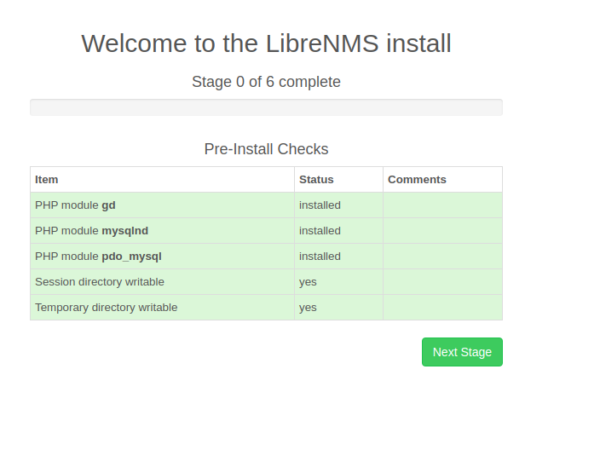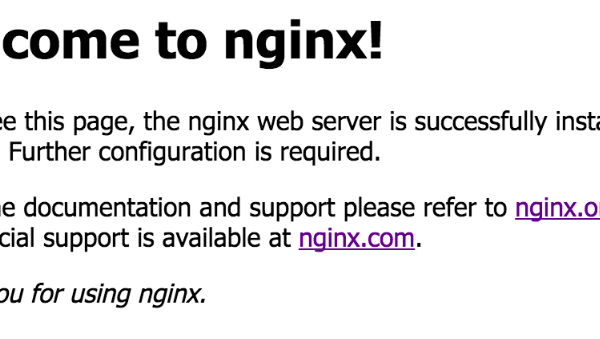System administrators are considered important people in the IT world, and their job is to ensure that all IT-related systems and services are running around the clock.
In every organization, whether SME (small to medium size) or large enterprise, system admins play a critical role in maintaining the successful operation of backend and frontend of IT infrastructure.
The roles and duties of a system administrator are diverse. They are not only limited to server management but also to all functions that ensure the smooth operation of the business operations.
System administrators must have experience in one or more technologies, including Windows, Linux, networking, data backup and recovery, security, databases, virtualization, cloud operations, etc.

Today, most organizations seek certifications in addition to technology experience to hire system administrators.
In this post, we will learn details about Linux system administrators such as Training and certification, industry opportunities, and other details that will help you advance your career as a system admin in Linux technology.
What are the roles and responsibilities of a Linux system administrator?
Generally, the duties of a system administrator are wide-ranging and vary from small enterprises to large organizations. Usually, system administrators take care of installing, supporting, and maintaining servers and related operating systems. They are responsible for service outages, troubleshooting, and major breakdowns in the infrastructure.

The following are a few broad roles that a Linux administrator should perform:
- Specific expertise for the support and maintenance of Linux servers and related infrastructure, including on-premises, cloud, and virtualization.
- Analyze and solve problems related to Linux operating system servers, hardware, applications, and software.
- As a Linux administrator with root access, they are responsible for maintaining all user accounts, all system configurations, all files on the server, etc.
- Install and configure servers and all related applications, backup and restore files, etc.
- Performance: Optimize the operating system, use tools to monitor server security, and maintain a secure system.
What are the requirements to become a Linux system administrator?

If you’re planning to become a Linux system admin or want to know the requirements, here are a few things most corporate HR teams consider before hiring for a Linux sysadmin position.
- Bachelor’s degree, preferably from engineering background like computer science, information technology, telecommunications etc.
- Previous work experience on Linux distributions such as RedHat, SUSE, CentOS, Debian, Ubuntu, and others.
- Most organizations seek Linux certification or training that the candidate has completed. Certificates like RHCT, RHCE, and LPIC will definitely make your CV stand out from the rest.
- Most virtualization is based on Linux servers. So if you are familiar with virtualization concepts like VMware, cloud, etc, this is an added advantage.
- The above requirements are Linux-specific requirements and if you have little knowledge of networking (routers, switches) and SQL databases then the candidate can easily fit into Linux admin jobs.
What are the Job opportunities for Linux admins?
Linux foundation publishes an annual report every year that provides IT professionals with clear and unbiased information on which skills are in demand.
The Linux Foundation report shows how certification benefits job seekers. The data shows that 88% of employers preferred to hire certified professionals in 2021.
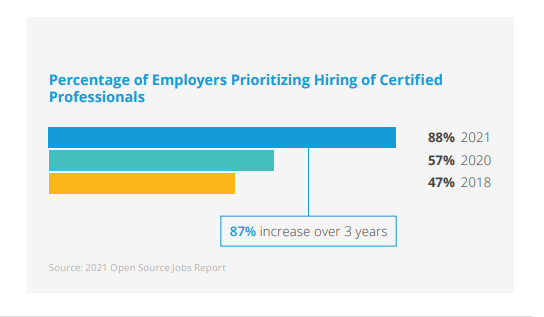
According to a report, 97% of hiring managers say their priority is a certified senior open source expert. The report also lists the hottest skills and the top two skills related to Linux.
Thanks to the invention of advanced technologies like big data and cloud computing, thousands of professional Linux jobs are available today.
Linux is an open-source platform that has proven its breadth and effectiveness. It is the base of choice for new technologies such as big data and cloud computing. Thousands of Linux specialists are needed to support this evolving platform in today’s market scenarios.
According to the Open Source Linux Report, Linux professionals are well-positioned in the job market, with 44% of hiring managers saying they have a good chance of hiring Linux-certified candidates while 54% expect certification or formal training for their employees.
Linux has two career paths to choose from, one is the administrator, and the other is the developer. Below are some of the designations available to Linux professionals.
- Desktop Application Development
- Kernel & Device Drivers Development
- Web Development & Deployment
- Systems Administration
- Systems Architecture/ Engineering
Salary range: According to Glassdoor, the median base salary for a Linux engineer in the UK is £48,177 per year, while in the US, it is $90,554 per year.
Let’s see the top Linux system administrator exams and certifications in the following section.
Essentials of Linux System Administration (LFS201)
Linux Foundation offers a variety of courses and training for professionals willing to undertake Linux certification.
Essentials of Linux System Administration course covers all basic knowledge up to level 1 Linux architecture and covers administration, configuration, and troubleshooting of any of the three major versions of Linux, Red Hat, SUSE, Debian/Ubuntu.
Applicants will also be introduced to useful tools and concepts for managing Linux infrastructure. Applicants interested in (cloud) virtualization may also benefit from this course as ESX hosts are based on the Linux platform.
At a broad level, the course content is as follows:
- Introduction to the Linux file system
- Disk activity like partitioning, mounting, RAID, etc.
- System optimization including monitoring, tuning and scheduling
- Manage user and group accounts including file permissions and more
- Backup and Restore
- Network configuration
- Problem-solving
This course is recommended if you want to acquire basic knowledge of Linux and understand how the Linux operating system is structured and works.
The course includes 50-60 hours of material, video content, and hands-on lab assignments.
The site also offers free courses and tutorials on system administration, cloud, and network administration.
Red Hat System Administration Boot Camp
Udemy offers this course to all ambitious candidates who wish to become a Red Hat Certified System Administrator (RHCSA). The course content corresponds to the RHCSA (EX200) exam administered by Redhat.
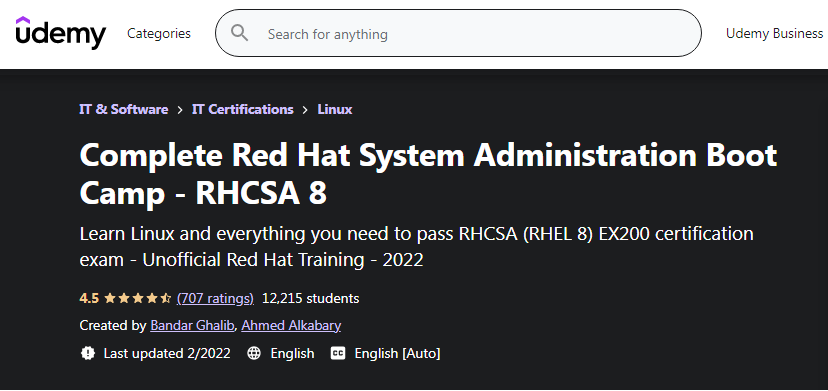
This course trains candidates in the following aspects of Redhat Linux:
- Linux operating system installation
- Introduction to Linux command-line interface
- Linux environment management in terms of user and group management, configuration, container management and shell scripting.
- Linux security and networking concepts are covered
- Finally practice questions are provided
The course also offers free access to two e-books:
- Learn Linux Quickly – Covers all basic Linux infrastructure
- Learn Ansible Quickly – This ebook covers Ansible Automation. It is required to pass Red Hat Certified Engineer (RHCE) certification.
The course is accessible via mobile and includes 11 hours of on-demand videos, 6 articles, 3 downloadable resources, etc.
RHCSA is one of the most valuable certificates in the Linux world and attracts a good package.
Linux Foundation Certified System Administrator (LFCS)
LFCS is designed by the Linux foundation for entry-level professionals in Linux systems. It is designed to take into consideration the growing demand for Linux professionals.

The exam includes scenario-based questions that will help professionals assess the actual Linux infrastructure. The exam focuses on two Linux distributions: Ubuntu 18 and CentOS 7, and candidates can choose one.
The candidate must solve the problem using the command line in the exam. After passing the LFCS exam, Linux admins demonstrate that they are capable of installing and configuring Linux systems and better understand critical technologies such as networking, storage, security, logging and monitoring, troubleshooting, and more.
The exam duration is two hours, and the certificate is valid for three years.
LPI Linux Essentials Bootcamp
The course is designed by Udemy, the world’s largest education platform with more than 30 million monthly visitors from 180 countries engage and a database of over 150,000 courses. This course prepares you for the Linux Essentials (010-160) of the LPI (Linux Professional Institute) exam.
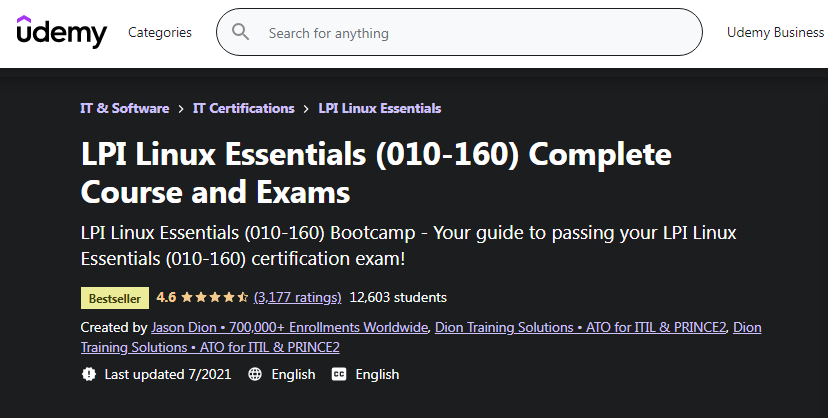
The Linux Professional Institute is a non-profit organization that provides global standards for certification and career support for open source professionals.
This course focuses on Linux operating system functionality, user management, security and administration, and command-line operations.
Upon completing the course, candidates can understand the basics of the Linux operating system and gain experience in configuring and managing Linux through hands-on laboratory exercises, and candidates can learn command-line utilities.
This course features video lectures, downloadable notes, live questions, and live exams. Upon completing the course, the candidates can gain insight into the LPI (Linux Professional Institute) Linux Essentials (010-160) exam.
This course is aimed at beginners to experts who want to increase their knowledge of the Linux operating system.
CompTIA Linux (EXAM CODE XK0-0040)
CompTIA Linux is one of the leading certification organizations and has issued more than 2.5 million certificates in areas such as cybersecurity, networking and cloud computing, and technical support.

This certification validates the competencies required to become a Linux system administrator, such as configuring, monitoring, and supporting Linux servers, hands-on experience in maintenance, etc.
The certification validates skills such as Linux management, administration, troubleshooting, security knowledge, automation and scripting, and more.
This certification applies to job seekers such as Linux administrators, network administrators, technical support specialists, and system administrators.
The exam lasts 90 minutes and has 90 questions. The questions given are in the form of multiple-choice questions and implementation questions.
LPIC-1
The LPIC-1 certification is offered by the largest and most recognized Linux certification organization, LPI (Linux Professional Institute). To get the LPIC-1 certificate, candidates must pass two exams – exam codes 101 and 102.
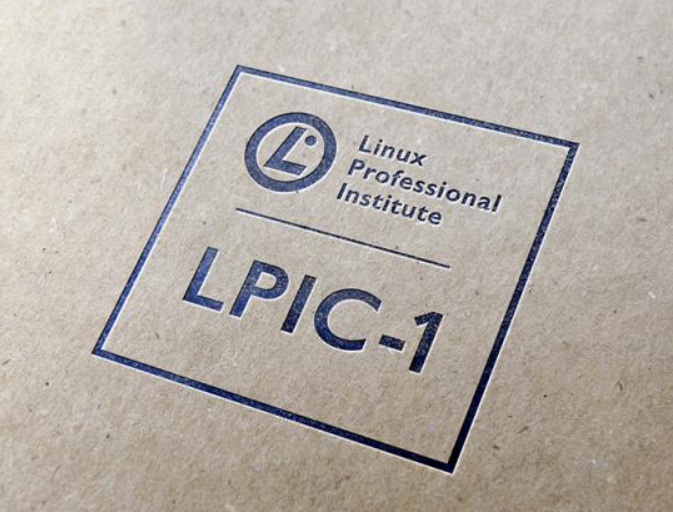
Exam 101 covers topics related to the architecture and installation of Linux operating systems, file systems, and GNU and Unix command, while Exam 102 covers topics such as shell scripting, administrative tasks, system services, interfaces, and networking and security.
Thus, candidates who have passed the LPIC-1 exam can generally take care of the Linux operating system in terms of installing and maintaining the Linux operating system and through the command-line interface, file system and user work administration, and other troubleshooting tasks such as backup, recovery and other maintenance activities.
Both exams consist of 60 multiple choices and fill-in-the-blank questions and last 90 minutes.
LFCA Certification Course
This LFCA certification course is offered on the Coursera platform by LearnQuest, the preferred training partner of the world’s leading companies, organizations, and government agencies.
The LFCA certification is administered by the Linux Foundation, and this course will help applicants with all content to achieve this certification. The LFCA exam focuses on basic IT skills, specifically in cloud technology.

This course is divided into 4 main specializations – Linux Basics, Managing Linux Systems, Securing Linux Systems, Linux Cloud, and DevOps.
This specialization is designed for beginners who want to start an IT career as an administrator or engineer to learn the Linux operating system, Linux system administration and security, Linux cloud operations, and programming.
Applicants can take this course to become IT professionals dealing with Linux operating systems and related services such as user management, installation, security, cloud, networking, and more.
Course duration is flexible enough to accommodate any specialization, and content includes videos, hands-on projects, quizzes, and virtual labs.
Coursera courses can be audited for free, and certificates can be obtained by paying the fee.
Benefits of Linux Certification

- Better chances of keeping your job: Certification demonstrates your commitment to improving your skills and knowledge, which also benefits employers. Therefore, some companies reimburse the cost of employee certification.
- Career Advancement and Personal Development: Certification helps improve skills in new technologies, giving managers the space to assign additional roles and responsibilities for career progression.
- Building Professional Confidence: Certification from specific vendors like Microsoft, Google, Cisco, etc. will surely earn professional trust. Earning this certificate demonstrates your commitment to professional development.
- Productivity and competitive advantage for organizations: Experienced professionals with specialized certifications are adequately qualified and have higher skills to work more efficiently in technology. In addition, organizations find a good marketing argument to show their customers that their employees are certified and reliable enough to increase productivity with lower risk.
- Stay on the cutting edge of technology: One important point to remember is that certification is not a one-time activity. If you want to stay up-to-date on technology, features, versions, updates, etc. then renewal and retention of certification is of utmost important. For this reason, some certification providers require recertification over a period of time, for example, Red Hat requires recertification at three-year intervals and AWS requires recertification at two-year intervals.
- Recertification helps professionals pursue improvements in certain technology platforms and keep their skills relevant.
At some point, recertification will feel like an unnecessary and time-consuming activity or burden, but there will be benefits to you and your current and future employers to hire you on a better pay package.
Conclusion
Linux certifications are beneficial if you want to advance your career as a Linux system administrator and will always have excellent career opportunities.
With the proliferation of cloud platforms and virtualization platforms, the demand for Linux professionals is increasing. Therefore, Linux certified professionals are highly valued by all types of organizations.
At the same time, because Linux is a free open source platform, its use will propel in the future, so Linux professionals will always be in demand.
By attending courses and training, professionals gain real work experience in infrastructure through simulation tasks, which organizations value as hands-on experience.
Before committing to certification, write down your educational path according to your area of interest and schedule appropriate training or courses to meet your career goals.
You may also look at these Linux System Admin books and videos.

